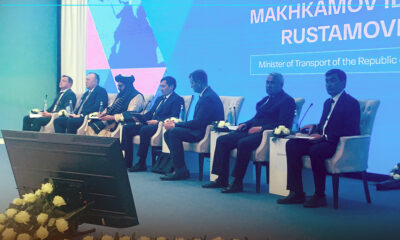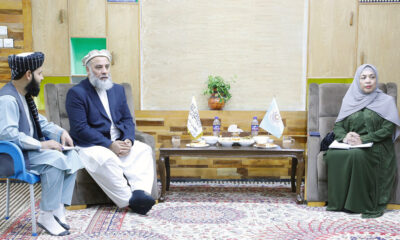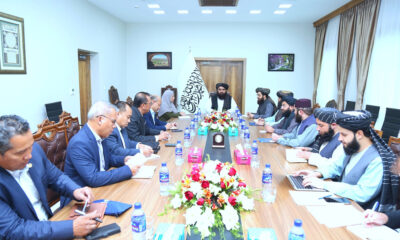Latest News
Cases of Torture Reduced in Afghanistan Prisons: UNAMA

In its latest report on the treatment of conflict-related detainees in Afghanistan published today, the UN documents an encouraging reduction in the number of cases of torture since 2016 but notes its ongoing concern at the high number of detainees who continue to report torture and ill-treatment.
The joint report by the UN Assistance Mission in Afghanistan (UNAMA) and the UN Human Rights Office, issued on the first anniversary of Afghanistan’s accession to the Convention Against Torture’s Optional Protocol, finds that nearly a third of conflict-related detainees interviewed provided credible and reliable accounts of having been subject to torture or ill-treatment.
The report is based on interviews with 618 detainees held in 77 facilities in 28 provinces across the country between 1 January 2017 and 31 December 2018.
The report acknowledges the progress made by the Government in implementing Afghanistan’s National Plan on the Elimination of Torture and highlights that this enforcement has had tangible results, with a reduction in torture or ill-treatment of conflict-related detainees across different security entities in the country.
Overall, among those in the custody of the Afghan National Defence and Security Forces, 32 percent based of the sample of the detainees reported torture and ill-treatment, compared to 39 percent over the previous reporting period (1 January 2015 to 31 December 2016). Notably, the reduction was more marked in 2018. In particular, within facilities of the National Directorate of Security (NDS), the prevalence of torture and ill-treatment of those interviewed decreased from 29 percent to 19 percent in 2018. And among conflict-related detainees held by the Afghan National Police (ANP), the proportion of those who reported torture or ill-treatment fell from 45 percent over the previous reporting period to 31 percent. Youngsters were at a higher risk of suffering mistreatment.
While the reduction in the number of cases is encouraging, the report notes that the “decline in the use of torture or ill-treatment is not yet significant enough to indicate that the remedial measures taken are sufficient.” The most common form of torture and ill-treatment reported was beatings.
The vast majority of detainees said they had been tortured or ill-treated to force them to confess and that the treatment stopped once they did so.
There are also major differences depending on the location of the detention facilities. While, on average, 31 percent of those ANP facilities reported torture or ill-treatment, the rate in the ANP facility in Kandahar was a very disturbing 77 percent, including allegations of brutal forms of torture, such as suffocation, electric shocks, pulling of genitals and suspension from ceilings. Allegations of enforced disappearances in Kandahar also persisted during the reporting period.
While the report highlights significant improvements for the NDS facilities in Kandahar and Herat, the treatment of conflict-related detainees in some NDS facilities also remains of concern, particularly those located in Kabul, Khost and Samangan provinces, as well as by the NDS counter-terrorism department. The report also highlights instances of unlawful and arbitrary detention, including following mass arrests, by NDS Special Forces and the Khost Protection Force.
The report further raises concern about poor conditions of detention observed within the Afghan National Army-run Detention Facility in Parwan, including overcrowding, inadequate lighting, the use of solitary confinement as the sole disciplinary measure and restrictions on family visits and access to lawyers.
“We welcome the steps taken by the Government to prevent and investigate cases of torture and ill-treatment over the past two years. However, as our report illustrates, there is still a long way to go to eradicate this horrendous practice among conflict-related detainees,” said Tadamichi Yamamoto, the U.N. Special Envoy for Afghanistan.
“Respect for the rule of law and human rights is the best way to create the conditions for sustainable peace,” he added.
The report emphasizes violations and challenges in other areas, among them, legal limitations on the right of conflict-related detainees to judicial oversight; lack of implementation of key procedural and other legal safeguards to prevent torture (medical screening, access to lawyers, etc.); continued absence of accountability for perpetrators, with very limited referrals to prosecution; and lack of any meaningful possibility of obtaining an effective judicial or administrative remedy.
UN High Commissioner for Human Rights Michelle Bachelet said the report’s findings demonstrate that the policies put in place to combat torture and ill-treatment were having effect – but they were far from sufficient.
“A year ago, on this day, the Government of Afghanistan committed itself to the prevention of torture by acceding to the Optional Protocol to the Convention against Torture,” Bachelet said.
“I urge the Government to work swiftly to create a National Preventive Mechanism to ensure independent, impartial scrutiny of the treatment of detainees. A well-resourced watchdog of this sort, which is able to make unannounced visits to places of detention and raise awareness of what constitutes torture and ill-treatment according to international human rights law, can go a long way towards the ultimate goal of fully eradicating torture.”
The status and treatment of conflict-related detainees held by Anti-Government Elements is not covered by the report.

Latest News
Uzbekistan’s humanitarian aid arrives in Balkh

A shipment of humanitarian aid from Uzbekistan was handed over on Thursday to the local officials of Balkh province in the trade port of Hairatan.
Local authorities said the aid, which includes flour, oil, wheat, sugar and meat, has been handed over by Uzbekistan’s Surkhandarya governor to the governor of Balkh.
The governor of Surkhandarya stated the purpose of sending this aid was to support the people of Afghanistan and stressed the need for the development of good relations between the two countries.
Latest News
Afghanistan’s problems caused more damage to Pakistan than 3 wars with India: Durrani

Islamabad’s special envoy for Afghanistan Asif Durrani said on Wednesday that Pakistan has suffered more due to Afghanistan’s internal situation than Pakistan has suffered in three wars with India in terms of blood spilt and finances drained.
Durrani said at a one-day International Conference titled “Pakistan in the Emerging Geopolitical Landscape”, which was organized by the Institute of Strategic Studies Islamabad (ISSI) and the German Friedrich Ebert Stiftung (FES), that over 80,000 Pakistanis died in the two decades of the War on Terror and that his country was still counting its dead and injured.
“After the withdrawal of NATO forces, it was hoped that peace in Afghanistan would bring peace to the region. However, such expectations were short-lived,” he said.
He also stated that attacks by the Tehreek-e-Taliban Pakistan (TTP) militant group on Pakistan’s border areas increased by 65 percent, while suicide attacks increased by 500 percent.
“The TTP’s enhanced attacks on Pakistan while using Afghan soil have been a serious concern for Pakistan. Another worrying aspect is the participation of Afghan nationals in these attacks,” he said.
Durrani also said Pakistan had suffered geopolitically since the Soviet Union invaded the neighboring country.
“The post-9/11 world order has negatively impacted Pakistan. Apart from losing 80,000 citizens’ lives, including 8,000 law enforcement agency personnel, the country’s economic opportunity cost is estimated at $150 billion,” Durrani said.
Talking about the future outlook for Pakistan in the regional context, Durrani said that while “our eastern neighbor is likely to continue with its anti-Pakistan pursuits, the western border poses an avoidable irritant in the short to medium term.”
However, he said Pakistan can overcome its difficulties with Afghanistan, including the TTP challenge.
Latest News
Afghanistan now a ‘nexus for diplomatic endeavors’, says IEA

In the wake of dozens of meetings between high-ranking Islamic Emirate officials and visiting officials from foreign countries, and other diplomatic advances, the IEA said on Thursday that in the current geopolitical landscape, Kabul now “serves as a nexus for diplomatic endeavors and political deliberations pertaining to global affairs”.
In a series of posts on X, the IEA’s spokesman Zabihullah Mujahid said diplomatic missions and political delegations from various nations, including Russia, Malaysia, Kazakhstan, Turkmenistan, the European Union, and others, “are evident in the capital, highlighting its strategic importance in fostering Islamic cooperation”.
He said: “Recently, the honorable Minister of Transport of the Islamic Emirate, Mr. Hamidullah Akhundzada, led a significant delegation to Termez, Uzbekistan, for essential discussions aimed at enhancing bilateral relations.
“These discussions encompass a wide range of topics, from trade facilitation to security assurances, indicating a focused effort by the Islamic Emirate to strengthen and broaden its international engagements, thereby ensuring sustained development and stability.
“These initiatives, characterized by diligence and effectiveness, underscore Afghanistan’s enduring commitment to diplomatic engagement and its pivotal role in regional and global affairs,” he said.
Mujahid added that these initiatives “also emphasize the vital connection between diplomatic efforts and economic prosperity, promising favorable outcomes for Afghanistan’s socio-economic landscape.”
He pointed out that despite ongoing challenges, Afghanistan “remains steadfast in its pursuit of prosperity and resilience, defying pessimistic projections and charting a course towards political and economic renewal.”
He said: “Continued efforts are essential to fostering inclusive growth and impactful initiatives, thus advancing Afghanistan’s journey towards sustainable development and increased influence on the global stage.”
-

 Latest News4 days ago
Latest News4 days agoPakistan’s frontiers minister stresses ‘dignified’ return of Afghan refugees
-

 Regional3 days ago
Regional3 days agoIranian president lands in Pakistan for three-day visit to mend ties
-

 Climate Change4 days ago
Climate Change4 days agoMassive river flooding expected in China, threatening millions
-

 Latest News4 days ago
Latest News4 days agoChinese keen to invest in Panjshir-Kabul water conduit project
-

 Latest News2 days ago
Latest News2 days agoRashid Khan named AWCC’s brand ambassador
-

 World4 days ago
World4 days agoTwo Japan navy helicopters crash, one body found, 7 missing
-

 Sport3 days ago
Sport3 days agoKolkata beat Bengaluru by one run in IPL as Kohli fumes at dismissal
-

 Sport3 days ago
Sport3 days agoACL: Aino Mina 3-0 Istiqlal Kabul; Attack Energy 3-0 Khadim



























